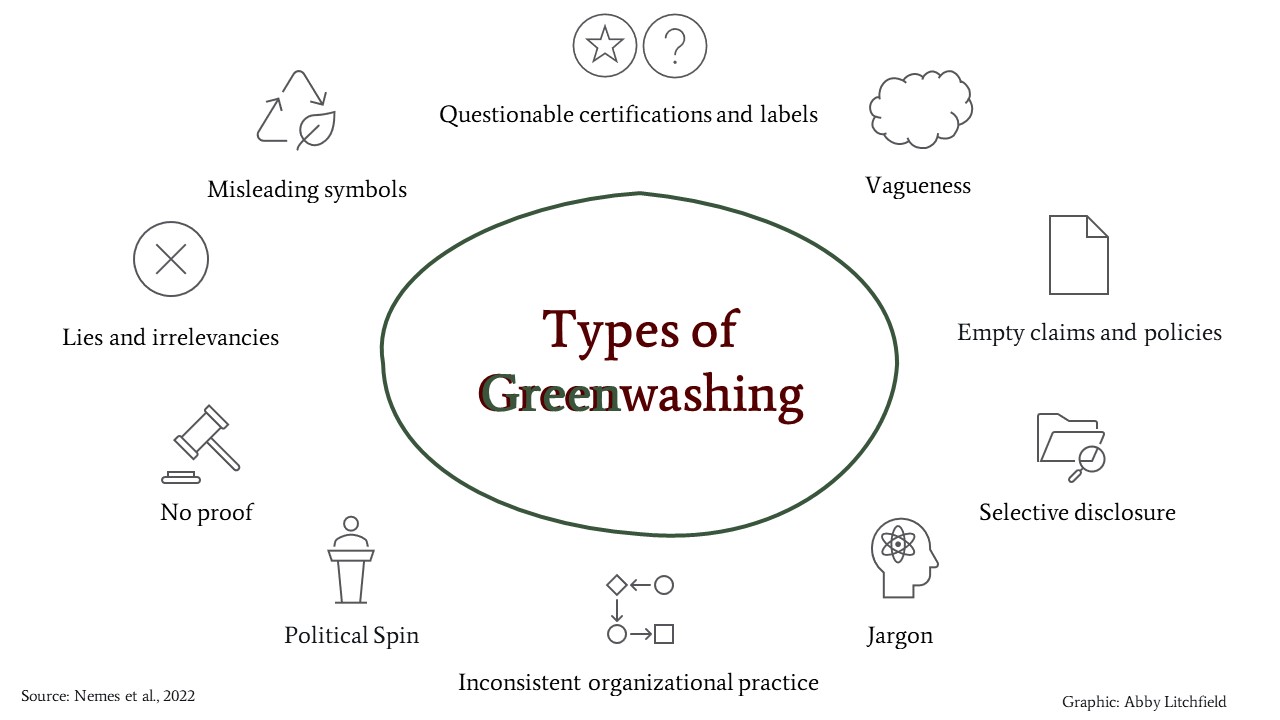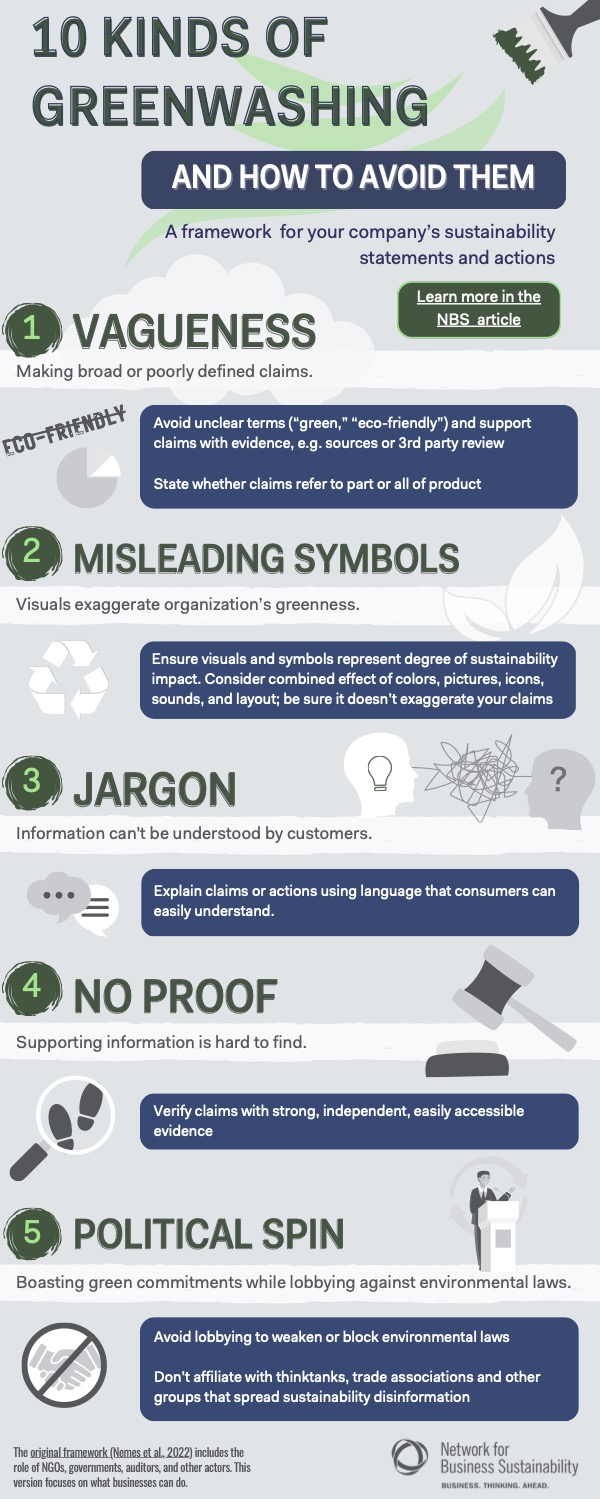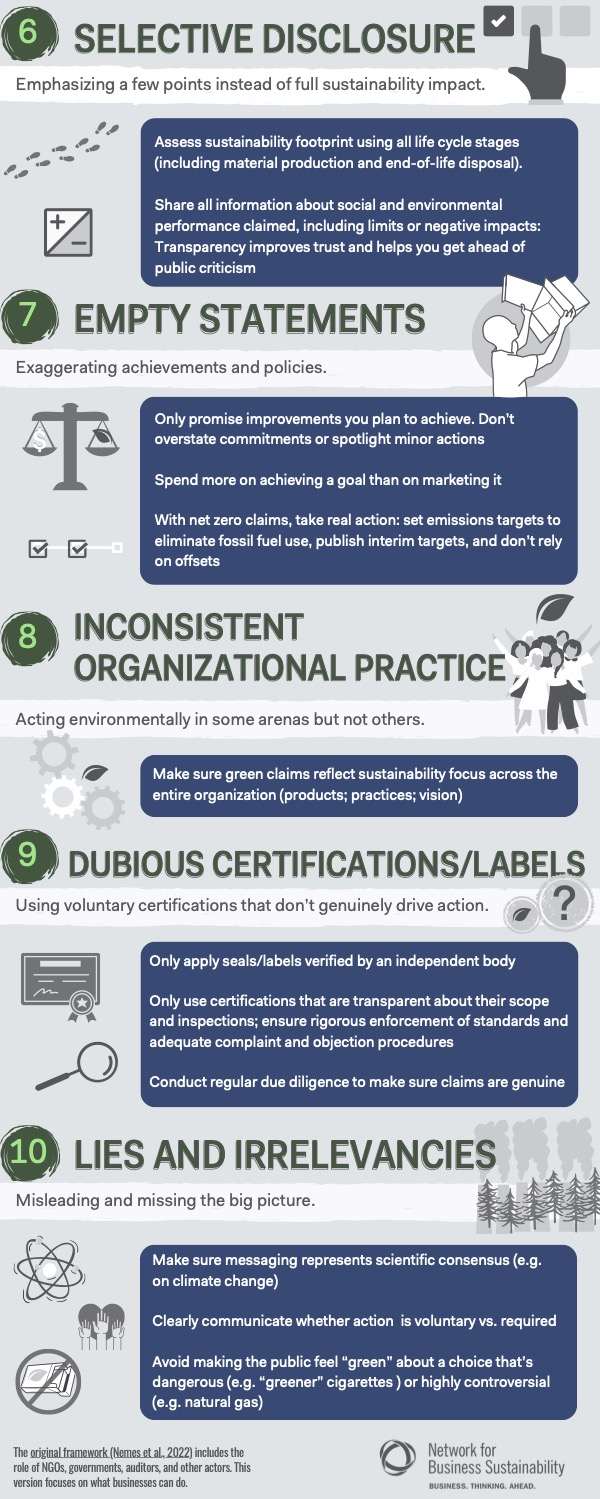Greenwashing harms the planet and can hurt your company’s bottom line. Here’s how to make your sustainability claims accurate.
People don’t like bad news.
But the truth is, we’re in danger here on Planet Earth. Extreme weather this summer touched many of us personally. Data show that humans are pushing the limits of our planet’s operating systems.
Companies are being asked to act more sustainably – and to be truthful about what they do. That means avoiding “greenwashing,” or false communications about environmental action.
Greenwashing is a big problem. Almost half of all environmental claims online are exaggerated, false or deceptive, according to a 2021 analysis in the European Union. The analysis criticized “vague and general statements such as ‘conscious,’ ‘eco-friendly,’ [and] ‘sustainable,’ which aimed to [tell] consumers that a product had no negative impact on the environment.”
You’ve probably heard of greenwashing. But sometimes it’s hard to know where the line is – and whether you’re crossing it. In your company, you might have responsibility for:
- Preparing a product marketing campaign
- Shaping net zero strategy
- Deciding on the company’s affiliations and public positions
This article gives you concrete guidance on how to avoid greenwashing in all these areas. We define greenwashing and explain why it hurts your company. We also give you a framework you can use to test your company’s claims – and make sure they’re on the right side of the line.
Our guidance comes from recently published research that reviewed academic and practical guidance on greenwashing and legal frameworks in the EU, UK, and US.
We hope it helps you guide your company toward a more truthful presentation of where you stand on environmental issues.
What Is Greenwashing?
Greenwashing means creating falsely positive views of an organization’s environmental performance. Simply stated: Organizations say that they are acting more sustainably than they really are. There’s a range from slight exaggeration to full untruth. Greenwashing can be either intentional or unintentional.
Traditional greenwashing is centred on products and advertising. You’ve probably seen product labels where the environmental claims are vague or undefined (like “eco-friendly”). Sometimes the environmental claim is made through images (waterfalls) and colors (green).
Greenwashing goes beyond advertising to other kinds of company action, though. Greenwashing is any action that misleads stakeholders regarding an organization’s environmental performance and benefits.
Here are some examples of climate-related action that represent greenwashing:
- Companies accept climate science but continue to support lobbying groups and politicians who engage in climate denial. Government action on climate thus becomes more difficult.
- Companies and governments emphasize unproven technologies such as carbon capture and storage and geoengineering — instead of tested, ready solutions like renewables and energy efficiency. This distracts from the urgency of the climate crisis and slows down action.
- A company might set a goal of net zero carbon emissions and pursue it through carbon offsets. Carbon offsets aim to balance out emissions by paying for activities that store carbon, like forest preservation. But while the concept looks good on paper, it’s not nearly as effective as directly reducing companies’ emissions.
Many companies are taking actions that mask a continuation of business as usual. These are a form of greenwashing: promising solutions to our environmental challenges, but knowing that they’re not enough. It’s an image of sustainability – that cracks under further examination.
This graphic shows different kinds of greenwashing you’re likely to come across.
In the last section of this article, we’ll provide a framework you can use to guide your company away from these kinds of greenwashing.
Why Greenwashing Happens
Greenwashing happens for several reasons:
Greenwashing contributes to short-term profitability. Consumers are more aware, so companies have financial incentives to be seen as more environmentally and socially conscious. One study shows 57% of consumers shifting behaviour to being more sustainable during the last few years. That’s a huge market.
Companies may greenwash unknowingly. Companies may also lack the expertise to know what is genuinely environmentally beneficial – or that expertise may be siloed. Environmental issues are complex, with constantly evolving terms and knowledge. Marketers may not realize what terms like climate-smart, sustainable, compostable or recyclable actually mean in the context of their business.
Greenwashing can be hard to spot. Consumers don’t have the time or expertise to investigate company claims. For example, tracing a product’s supply chain is difficult even for the experts. Consumers can’t tell how their purchase was produced. This means misrepresentation is relatively easy for companies to get away with.
Social media spreads misinformation. As we all know, the world of information is chaotic. Social media platforms provide easy tools to market brands and services widely. But brief communications can remove nuance and misinformation spreads easily.
Greenwashing Costs Companies and the Planet
Greenwashing is a major obstacle to sustainability. It covers up the continuation of unsustainable practices. It makes it easier for consumers, governments, and even companies to believe that enough action is happening on environmental issues, when it isn’t. The practice results in “false confidence that we are already addressing the causes and treating the symptoms of the climate crisis,” said the Chair of the UK Environmental Agency recently.
Despite the potential short-term benefits, greenwashing can be problematic for companies as well. Overstating environmental performance puts companies at risk for lawsuits about violating consumer laws. Companies currently face class-action lawsuits for overstating environmental claims. The European Union is building greenwashing into its Unfair Commercial Practices Directive, and individual countries are taking action with severe penalties.
The risks of reputational damage can be even greater, though. Employees, consumers, and investors are all looking for companies to behave sustainably. If a company’s “green” image cracks, fallout can be broad. Researcher Ioannis Ioannou and colleagues report that companies that are perceived to be greenwashing suffer, on average, a 1.34% drop in their customer satisfaction score. This is significant, they note: “Companies are intensely competing within a relatively narrow range of ACSI scores, and a 1.34% drop matters.”
How to Avoid Greenwashing: Our Framework
Here’s a framework for organizations that want to avoid greenwashing. This was developed by an interdisciplinary group of scientists who are part of a Climate Social Science Network working group on greenwashing. From their review of academic research and legal frameworks, they’ve identified specific types of greenwash and questions that can easily identify them. For more details and guidance, see their full table.
Below, we boil it down 10 kinds of greenwashing — and tips to avoid each. Use this graphic to check your company’s statements and claims and identify any danger areas. Click the image to download a copy for your team.
For a Better Future, We Need Truth – not Greenwashing
The next years are likely to test us all. Many of us experienced wildfires, drought, or floods this year. These climate extremes are increasing. We need a world where our kids and their kids can access clean water and air and a liveable environment.
To reach that world, we’re going to need science, and we’re going to need trust. Greenwashing provides a confusing narrative of false facts. It makes it hard for people to make informed decisions. And it undermines their faith in the institutions, including business, that shape our world.
This framework can help you and your company move toward greater social contribution and engagement. Share your thoughts with us – reach out at info@nbs.net and tell us about your journey to clearer sustainability claims and action.
About the Authors
This article was written with contribution from the Climate Social Science Network (CSSN): specifically, the Working Group on greenwashing.
The specific contributor is Noémi Nemes, a freelance researcher on sustainability. She is lead author of the Working Group’s peer-reviewed 2022 article, “An Integrated Framework to Assess Greenwashing.” The article is available here, and a more detailed version of the framework is available here.
CSSN is an international network of scholars headquartered at the Institute at Brown for Environment and Society, launched in October, 2020. Scholars in the network are social scientists producing peer-reviewed research focused on understanding political conflict over climate change.







Add a Comment
This site uses User Verification plugin to reduce spam. See how your comment data is processed.This site uses User Verification plugin to reduce spam. See how your comment data is processed.